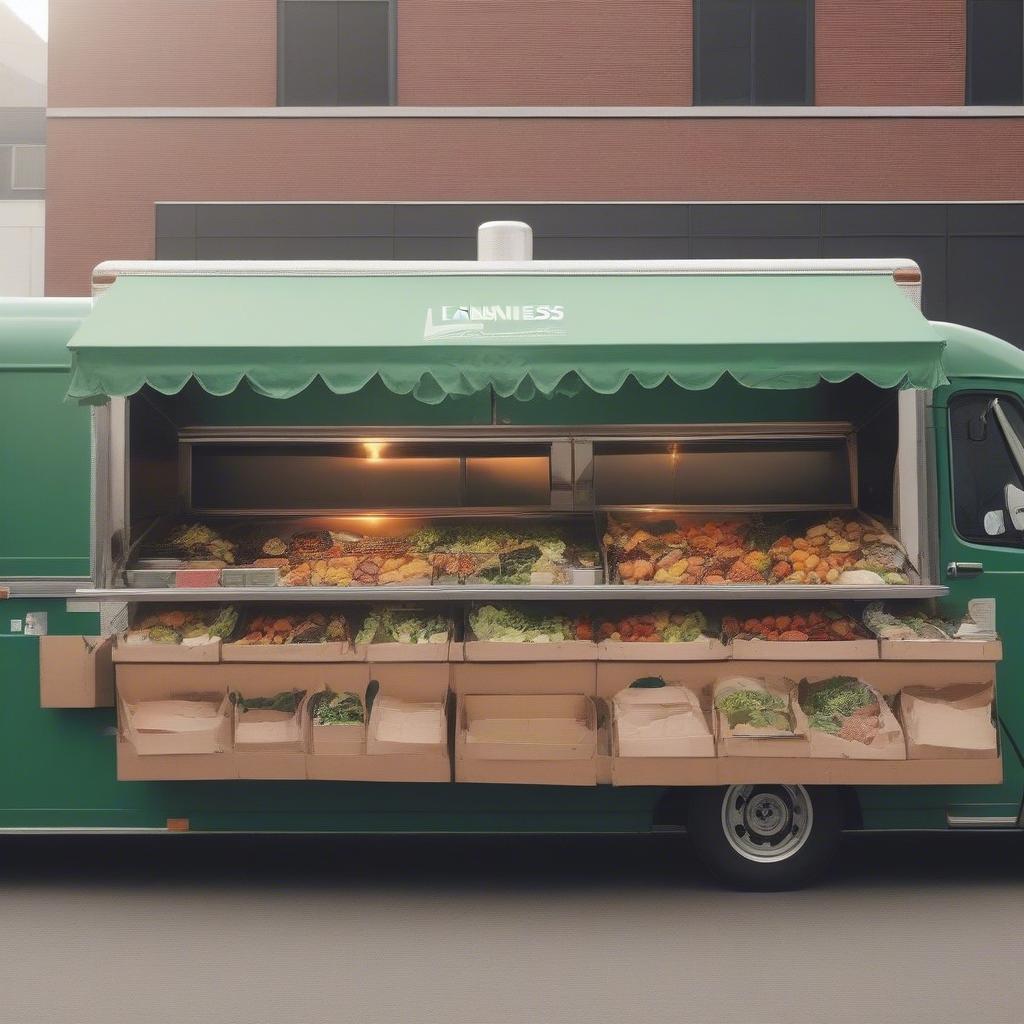
The food truck life: a vibrant, bustling world of delicious aromas and on-the-go goodness. But behind every successful food truck is a hardworking small team, the engine that keeps the wheels turning and the food flowing. Effective management of that team isn’t just a good idea, it’s the bedrock of your entire operation. Whether you’re dishing out gourmet tacos or slinging the best burgers in town, understanding how to nurture, motivate, and direct your food truck staff is crucial for survival and growth.
Why Effective Team Management is Non-Negotiable for Food Trucks
Why dedicate time and energy to crafting a rock-solid team management strategy? Because without it, your delicious dishes and clever branding may crumble. Poor management practices are a recipe for disaster, often leading to:
- High Staff Turnover: Constant hiring and training eats up time and resources, diverting your attention from critical areas like food prep and customer engagement. Imagine constantly having to train new employees on your processes – that’s time away from growing your business.
- Inconsistent Service Quality: A disorganized team translates to inconsistent food quality, slower service times, and frustrated customers. One day they get a perfect burger, the next it’s not up to par – this inconsistent experience makes it hard to build loyalty.
- Low Morale and Burnout: When the workload is unevenly distributed or communication is poor, your team quickly becomes demotivated and burnt out. A stressed and unhappy team reflects poorly on the whole operation.
- Lost Revenue and Missed Opportunities: These issues all lead to decreased efficiency, lost sales, and a missed chance to establish a thriving business. A poorly run food truck might not meet its full potential.
Conversely, a well-managed team provides:
- Consistency: Customers know what to expect every time they visit, building trust and loyalty.
- Efficiency: Streamlined processes minimize wait times and maximize output.
- Innovation: Happy and engaged employees are more likely to suggest improvements and contribute creative ideas.
- Positive Brand Image: Friendly, efficient service translates to positive word-of-mouth, attracting more customers.
Building Your Dream Food Truck Staff: Hiring the Right People
Finding the right team members is your first step toward building a smoothly run food truck. Consider these key elements when hiring:
Identifying the Required Skills and Roles
Before you start interviewing, carefully map out the roles you need to fill. A typical small food truck team might include:
- Chef/Cook: Responsible for preparing food, maintaining quality, and ensuring consistency.
- Cashier/Order Taker: Handles customer orders, takes payment, and provides excellent customer service.
- Prep Cook/Food Runner: Assists with food preparation, stocks supplies, and runs food to customers.
Consider that some of your team members might be wearing multiple hats at the beginning and that they will eventually need different specializations. Make sure to consider your future needs when hiring.
Crafting Effective Job Descriptions
Your job descriptions should be clear, concise, and accurately reflect the requirements of each role. Include:
- Job Title: Clearly state the position title (e.g., “Line Cook,” “Cashier/Customer Service Representative”).
- Responsibilities: Detail the specific tasks and duties associated with the role.
- Qualifications: Outline the necessary skills, experience, and certifications.
- Work Schedule: Specify working hours and days.
- Compensation: Clearly state pay rate, benefits, and incentives.
- Company Culture: Add a brief paragraph talking about your company’s culture and values to ensure candidates are aware of what they are getting into.
Sourcing and Screening Candidates
Utilize a combination of methods to find qualified candidates:
- Online Job Boards: Post your job listings on popular job boards and platforms.
- Local Culinary Schools: Reach out to culinary schools for new grads and apprentices.
- Community Boards: Utilize local community boards, and neighborhood groups.
- Networking: Tell your friends, family, and current team members about openings.
When screening resumes and applications, look for candidates who:
- Have Relevant Experience: Prior food service experience is a plus.
- Show Enthusiasm and Passion: A love for food and customer service is essential.
- Are Reliable and Punctual: This is a must for any food truck operation.
- Have a Positive Attitude: A team player will help create a welcoming work environment.
The Interview Process: Getting to Know Your Candidates
The interview process is your chance to get to know candidates beyond their resume.
- Prepare Specific Questions: Don’t just rely on general questions. Prepare questions specific to the role and your food truck.
- Assess Their Personality and Fit: Consider how the candidate’s personality will mesh with the rest of the team.
- Consider a Working Interview: Ask candidates to work for a short period to assess their skills and work ethic in real time. This is especially helpful for cooking positions.
- Ask for References: Always verify references to gain insights into a candidate’s past performance.
Effective Management Tips for Your Food Truck Team
Hiring the right people is just the beginning; effective management tips are what keep your team operating like a well-oiled machine. Here’s how to cultivate a positive and productive work environment:
Clear Communication: The Cornerstone of a Strong Team
Open and transparent communication is absolutely vital for a successful food truck operation.
- Daily Briefings: Start each day with a brief team meeting to discuss the day’s goals, any specials, important information, and answer any team member questions.
- Active Listening: Truly listen to your team’s concerns and feedback. Create a space where team members feel safe to share their thoughts.
- Consistent Feedback: Provide regular feedback on individual and team performance, both positive and constructive. This allows team members to feel seen and appreciated.
- Use Multiple Communication Channels: Utilize a mix of communication methods (e.g., group chats, email, face-to-face) to ensure everyone stays in the loop.
- Clear Expectations: Provide clear, written guidelines for each role, including checklists for opening and closing procedures and specific tasks.
Scheduling and Time Management: Keeping it Efficient
Poor scheduling can lead to burnout and conflict within the team.
- Fair Scheduling: Create schedules that are fair and consistent, while taking into account individual needs and availability.
- Track Time Off Requests: Implement a formal system for requesting time off, making it clear that requests should be made with sufficient notice.
- Avoid Overstaffing and Understaffing: Monitor peak hours and schedule accordingly to avoid having too many or too few staff at any one time.
- Cross-Train Your Team: This allows for more flexibility in scheduling, and ensures that all team members can cover different positions, creating a more reliable operation.
Delegation and Empowerment: Sharing the Load
As the owner, you can’t do everything yourself. Learning to delegate is critical for your own sanity and your team’s growth.
- Identify Each Team Member’s Strengths: Assign tasks based on individual strengths and interests.
- Provide Necessary Training: Make sure team members are fully trained to complete the tasks they are responsible for.
- Allow Team Members Autonomy: Empower your staff to make decisions and take ownership of their work.
- Offer Opportunities for Growth: Provide opportunities for team members to take on new challenges and advance their skills.
Motivation and Recognition: Fueling Your Team
A motivated team is a productive team. Here’s how to keep your team engaged and enthusiastic.
- Regular Recognition: Acknowledge and appreciate team members’ contributions regularly. A simple “thank you” or a public shout-out can go a long way.
- Incentive Programs: Consider implementing performance-based incentives, such as bonuses or rewards for exceeding sales goals or receiving positive customer feedback.
- Team Building Activities: Plan occasional team outings or social events to foster camaraderie and build stronger relationships.
- Professional Development: Support team members in their professional development by providing training opportunities or workshops.
- Celebrate Successes: Acknowledge and celebrate both team and individual successes, whether big or small.
- Create a Positive Work Environment: Focus on creating an environment where employees feel supported, respected, and valued.
Handling Conflict and Difficult Situations
Even in the best of teams, conflicts and challenging situations will inevitably arise.
- Address Issues Promptly: Don’t let conflicts fester. Address them quickly and directly.
- Listen to All Sides: Provide an opportunity for each person involved to share their perspective without interruption.
- Mediate Fairly: Remain neutral and focus on finding a solution that is fair to all parties involved.
- Set Clear Expectations: Make sure everyone understands their roles and responsibilities to minimize future conflicts.
- Document Incidents: Keep a written record of any serious incidents or recurring issues.
Legal Considerations for Your Food Truck Staff
It’s crucial to understand and comply with all applicable labor laws and regulations.
- Minimum Wage and Overtime: Pay your employees at least minimum wage and compensate for any overtime hours worked.
- Payroll and Taxes: Establish a clear system for payroll processing and withhold necessary taxes.
- Employee Classification: Understand the difference between employees and independent contractors and classify team members correctly.
- Workplace Safety: Ensure a safe work environment by providing adequate safety training and equipment.
- Compliance with Local Regulations: Stay informed about local regulations regarding food handling, employee rights, and permits.
Utilizing Templates and Tools for Efficient Management
Leverage templates and tools to streamline your management tasks. This will help keep you organized and efficient.
- Scheduling Templates: Use scheduling apps or spreadsheets to organize your team’s work hours.
- Time Tracking Software: Utilize software to accurately track employees’ working hours.
- Inventory Tracking Sheets: Keep track of food and supply inventory using digital or physical sheets.
- Checklists: Create checklists for opening and closing procedures, and routine maintenance.
- Communication Apps: Utilize group messaging or project management software for easy communication.
How Learn Business Supports Your Food Truck Management Journey
Learn Business is committed to supporting small businesses like yours. We understand the challenges of managing a food truck, from daily operations to team management. That’s why we offer a range of services designed to help you succeed:
Tailored Guidance and Support for Food Truck Businesses
We understand that every business is unique. Our team of experts provides guidance specifically tailored to your food truck’s needs. We provide you with a customized plan to overcome your unique challenges.
- Personalized Consultations: Get one-on-one consultations with experienced business advisors who understand the food truck industry.
- Industry-Specific Advice: Receive targeted advice on team management, marketing, and operational strategies specific to food trucks.
- Access to Best Practices: Learn from successful food truck operators and implement proven strategies for growth.
Template Library for Streamlining Operations
Our template library is packed with resources designed to make your life easier. Say goodbye to time-consuming tasks; our templates will save you time and effort.
- Hiring Templates: Access ready-to-use job descriptions, interview questions, and offer letters.
- Scheduling Templates: Simplify scheduling with customizable templates and tools.
- Training Manuals: Utilize training manuals to ensure consistent training for all team members.
- Financial Templates: Manage your finances with budget templates, inventory sheets, and expense trackers.
Educational Resources for Continued Growth
Learn Business doesn’t just offer immediate solutions; we empower you with the knowledge to grow and adapt.
- Online Courses: Enroll in online courses on topics such as team management, customer service, and financial management.
- Webinars and Workshops: Attend live webinars and workshops to learn from industry experts and network with other food truck owners.
- Resource Library: Access a library of articles, guides, and checklists covering all aspects of food truck management.
Learn Business is dedicated to your success, offering the resources and support you need to manage your small team effectively and achieve your food truck dreams.
Conclusion: The Importance of Investing in Your Team
In the fast-paced world of food trucks, your small team is your most valuable asset. By focusing on effective management tips , hiring the right people, and creating a positive work environment, you can ensure your business thrives. By building a strong, motivated, and well-managed food truck staff, you will be well on your way to serving delicious food and making a lasting impression on your customers. Remember that investing in your team is an investment in the success of your entire operation. With the right team, your food truck won’t just survive; it will flourish.



Leave a Reply